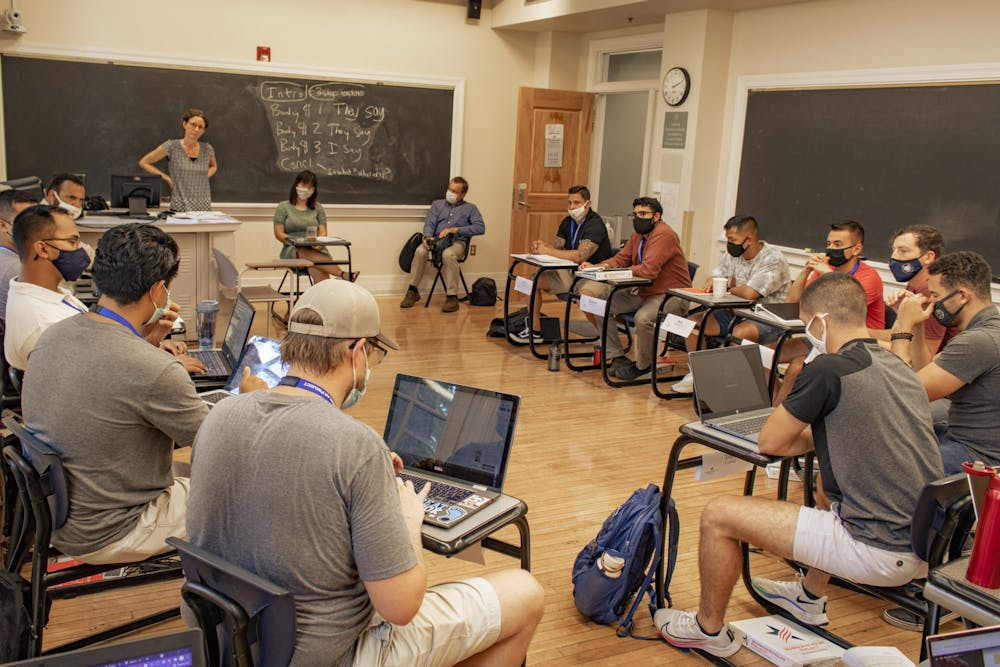“Fundamentally, for me, a big part of the goal is helping student veterans understand they have a place on college campuses,” Lithgow said. “They can draw on their experiences and the skills they have learned, and it can bring them strength in university.”
To facilitate the transition, there are three alumni of the program who return each year to act as fellows. These fellows operate as counselors and teaching assistants, helping participants with everything from finding the dining halls to leading study sessions.
The road to UNC, at 31 years old
Due to personal reasons, Raiford did not attend college directly after high school. He enlisted in the Navy, hoping to use it as a way to develop a skill set.
“It’s a rough life,” he said. “I worked 80 to 90 hours a week for the last eight years.”
In the nuclear power program, he learned to operate and maintain nuclear reactors, and eventually went to work with submarines. Raiford was stationed in Guam for five years as a nuclear reactor engineering supervisor, leading a team of nine and completing 11 missions. For the last three years of his Navy career, he was an instructor at a nuclear training unit, where he gave lectures about reactor theory and engineering.
After applying for WSP, Raiford was accepted and participated in the 2019 Cornell University summer, where he learned from “department heads with crazy backgrounds – the experts in their fields,” he said.
The program, centered on Alexis de Tocqueville’s "Democracy in America," was based on the Constitution, Bill of Rights, democracy in America and the veteran perspective.
In the program, Raiford learned how to actively read and interpret texts, as well as develop his writing skills with the help of writing coaches.
After his service, Raiford decided to complete a year at Wake Technical Community College so he could live at home with family and friends during the COVID-19 pandemic.
Being several years older than the average college student, and well-traveled from the military, Raiford thinks his experiences allow him to bring a new perspective to the discussion.
“We had discussions on 9/11 and no one in my class was even born then,” he said. “I was in the library in 6th grade watching the second plane hit the tower.”
To get the day's news and headlines in your inbox each morning, sign up for our email newsletters.
But his experiences do not spare his nerves.
“It’s kind of intimidating coming to the UNC area as a 31-year-old with all these intelligent 18-, 19-, 20-year-olds,” he said.
Raiford said he will be attending UNC starting this fall to pursue a degree in economics.
The WSP experience at UNC
After dropping out of high school in 10th grade, Chris Whitney enlisted at 18-years-old and completed eight years of active duty, where he was a mortuary affairs specialist. After leaving the service in 2015, he worked for several sole-proprietor companies before realizing that he wanted to go back to school.
Whitney eventually went to a community college in Norfolk, where he became the president of the Student Veterans of America, where he found “a real love for serving again,” he said.
Whitney heard about WSP through other SVA members, and being a Chapel Hill fan, he decided to sign up for the 2021 program at UNC.
Having not been in school for about 13 years, Whitney said he was nervous to return, but at WSP he learned that the professors and his fellow classmates were just as nervous as he was. The warm and welcoming atmosphere eased his nerves.
“I really have to shout out Dr. Lithgow: the most influential person that we came across that week,” he said. “Her warmth and welcomeness itself is what set the tone for the week for the rest of us.”
At the program, Whitney met a diverse cohort of veterans, who had respectful, intellectual discussions – an environment he had not previously been exposed to due to COVID-19.
“It sounds super cheesy, but there was not one bit of tension between 14 dudes, which I have personally never seen,” he said.
Whitney, who is currently in the application process for UNC, hopes to join the UNC community in the fall to build on his associate’s degree in business administration.
“As a kid who had dropped out in 10th grade, I had never thought that being able to apply to Chapel Hill would be in the realm of possibility,” Whitney said.
university@dailytarheel.com




